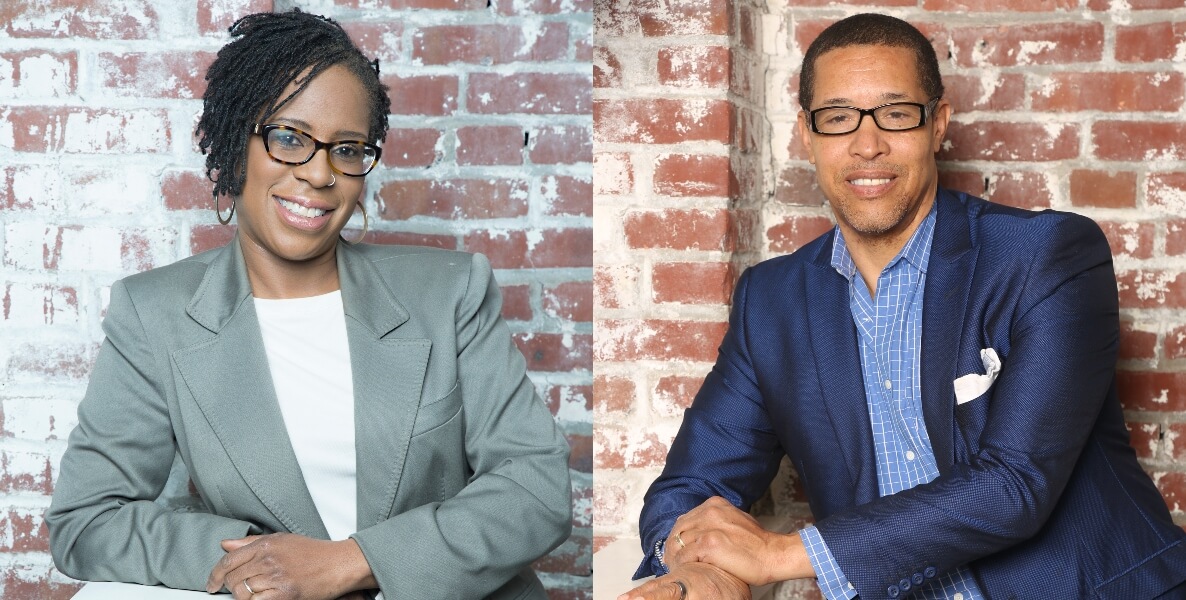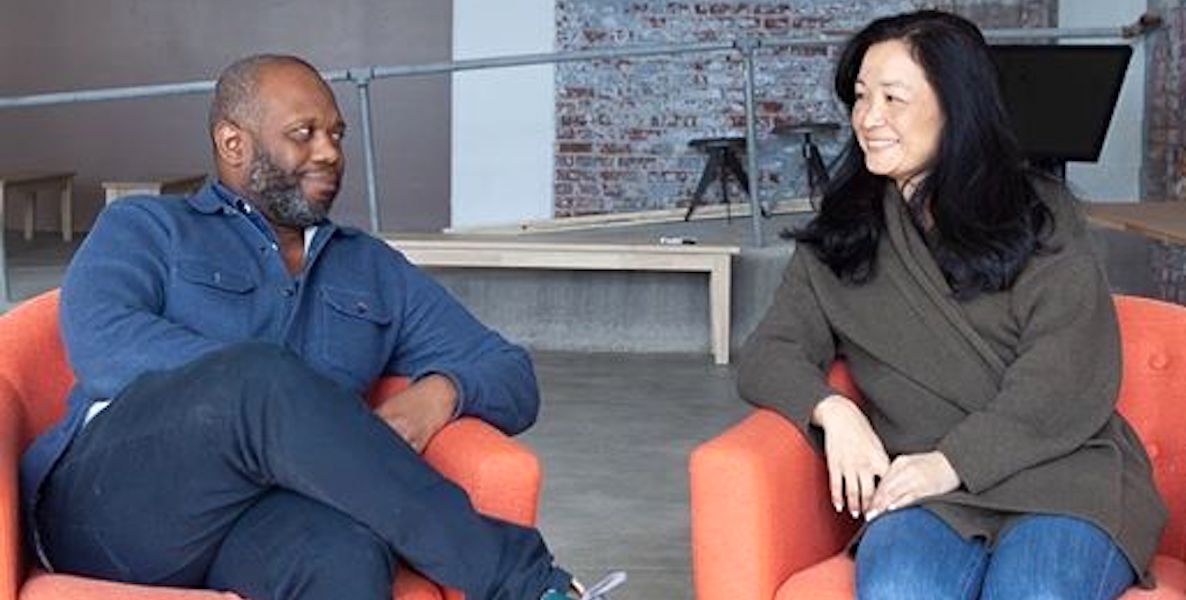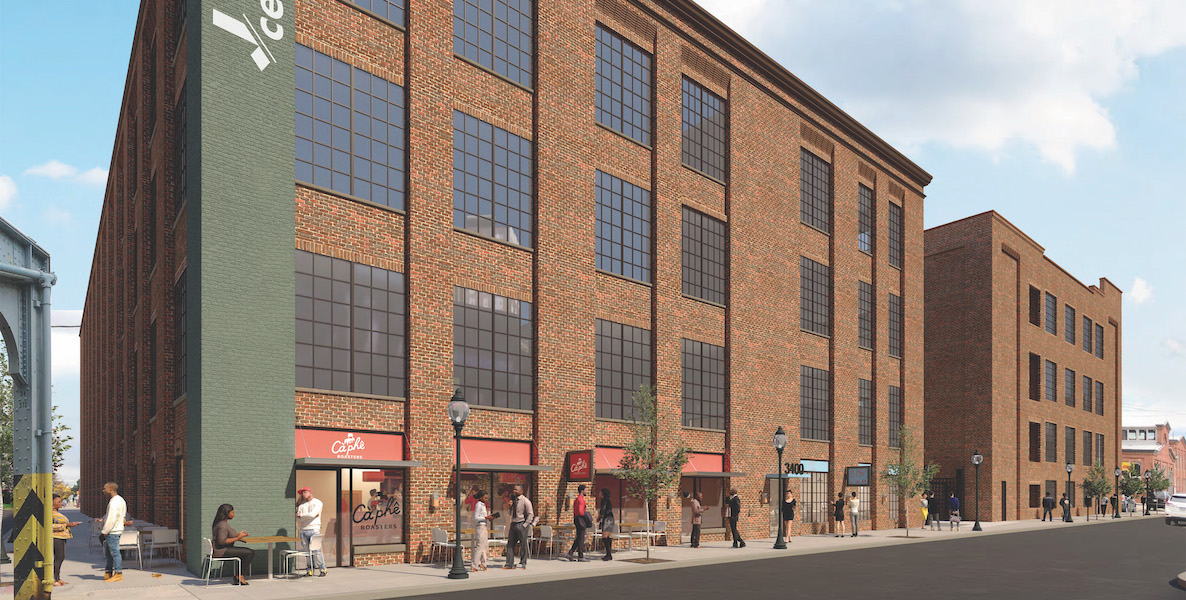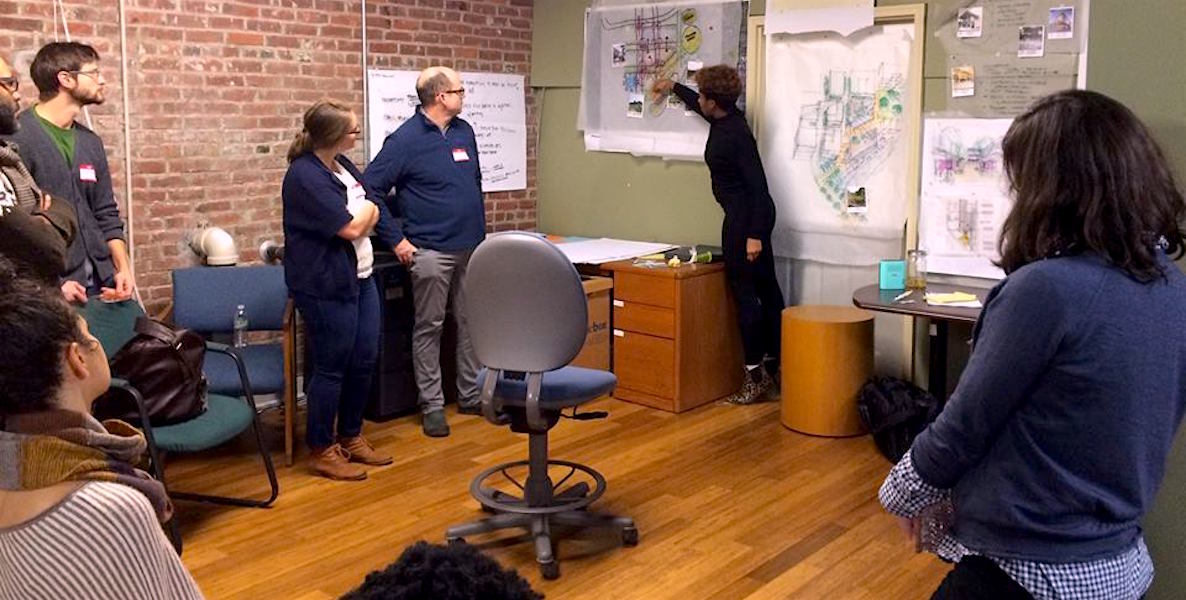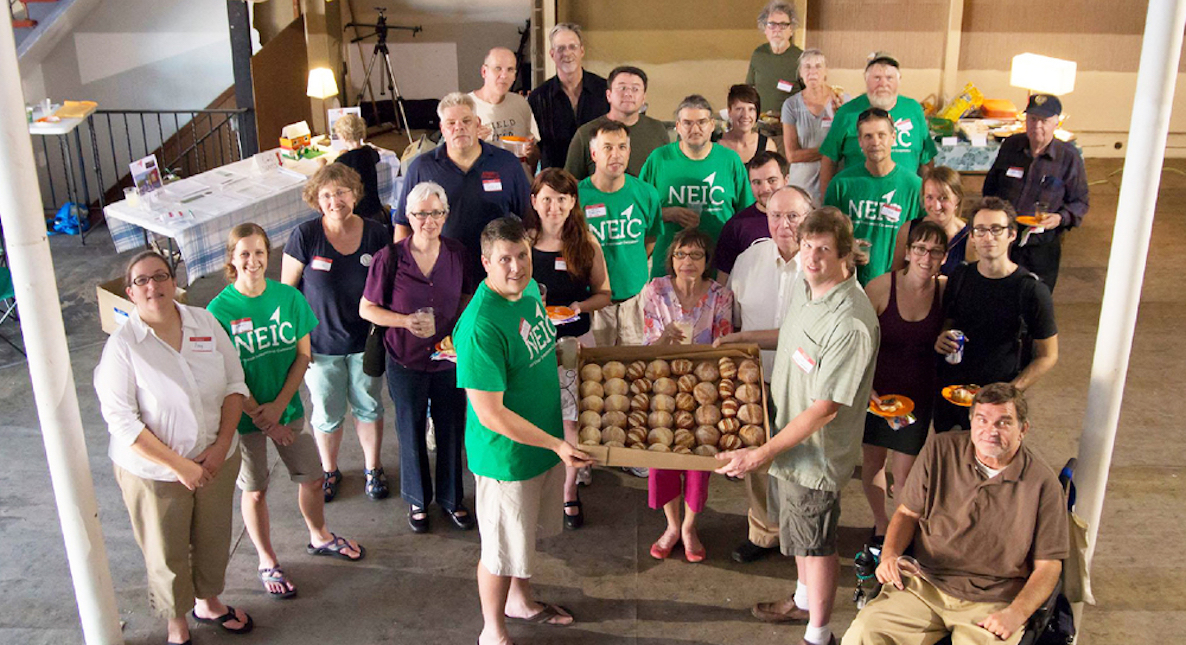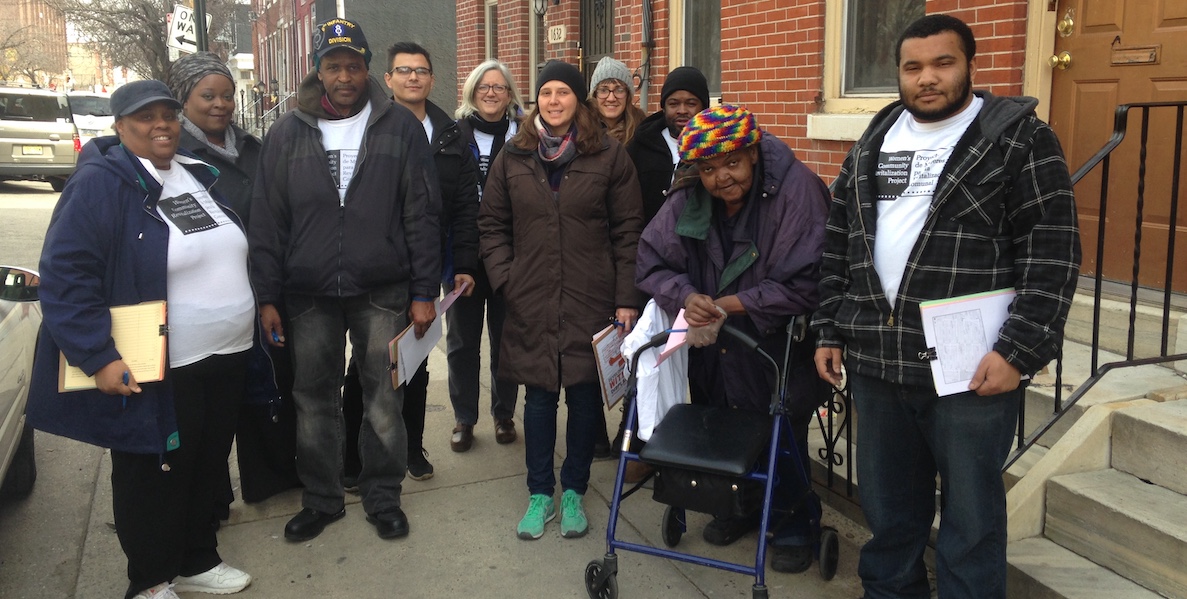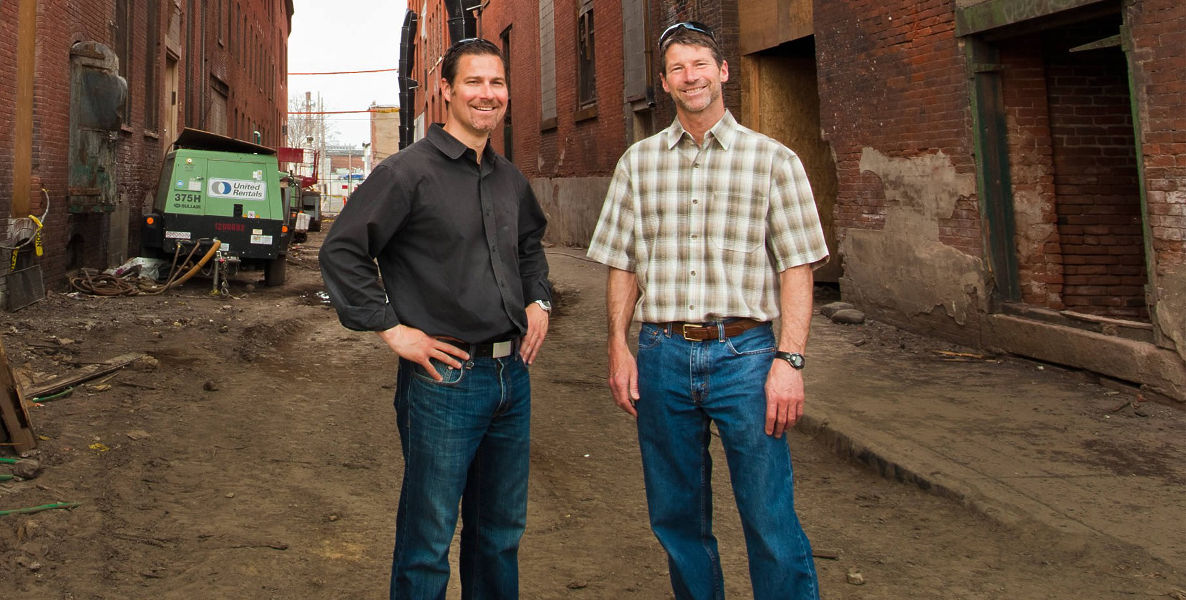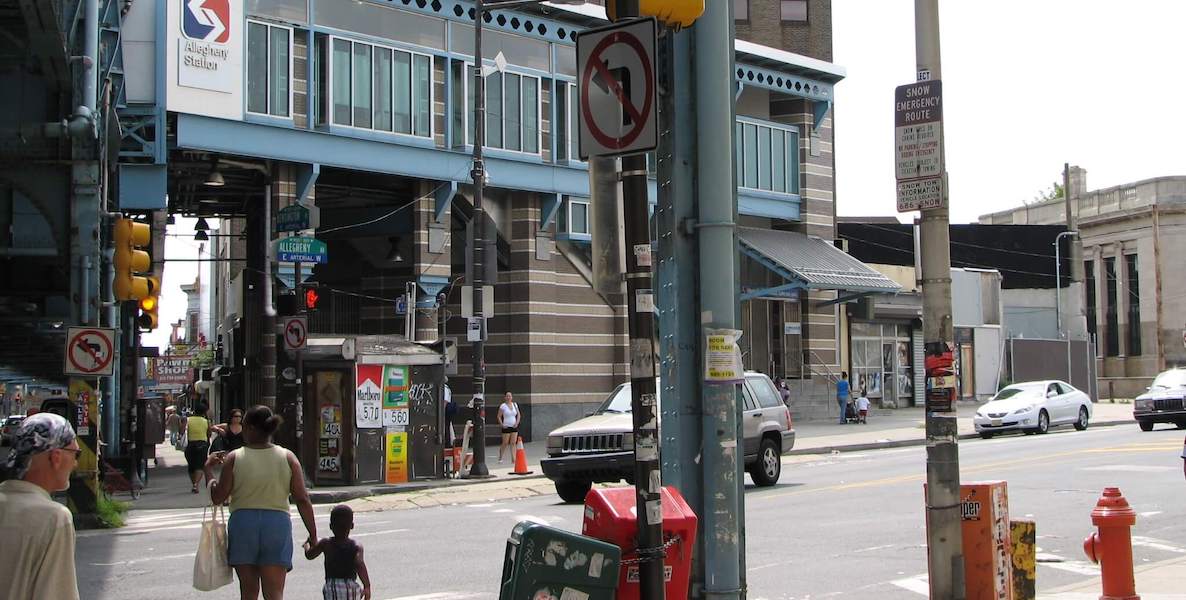When Casey O’Donnell and Daniel Betancourt first met in 2018, in an abandoned warehouse near A Street and Indiana Avenue in Kensington, they recognized in each other a vision that not everyone could share.
From the fifth-floor window, the two CEOs looked over blocks of row homes and empty warehouses, to what most people would see as blight and years of economic disinvestment. And for good reason: With over 50 percent of its population living in poverty, Kensington is one of the city’s poorest neighborhoods. Once home to manufacturing and textile mills, the neighborhood has seen these working-class jobs disappear steadily as factories closed. The median household income in the area is $20,807 — 51 percent of Philly’s median and 36 percent of the national figure.
MORE ON DEVELOPMENT IN KENSINGTON
-
- NKCDC steps in to help Kensington businesses survive the pandemic
- Can this Kensington art park help forge a connection between new and longtime residents?
- New residential project in Kensington will give tenants a discount if they volunteer
- Best-selling novel Long Bright River takes readers inside the Kensington opioid crisis
What O’Donnell and Betancourt saw, though, was potential — for small businesses, affordable housing, a vibrant and growing community.
“He didn’t see the problems,” says Betancourt, president and CEO of the community development financial institution (CDFI) Community First Fund, of O’Donnell. “He saw the opportunities.”
This shared vision for the area drove Betancourt and O’Donnell, who is CEO of Kensington community development organization Impact, to begin working together in 2018 to revitalize the neighborhood.
A partnership is born
Soon, their organizations joined with two others — community development organization LISC Philadelphia and FINANTA, a CDFI that has since merged with Community First — to form the Kensington Lending Partnership (KLP), which has so far given out $15.6 million in affordable loans for small businesses, affordable and mixed use development projects, and residential mortgages.
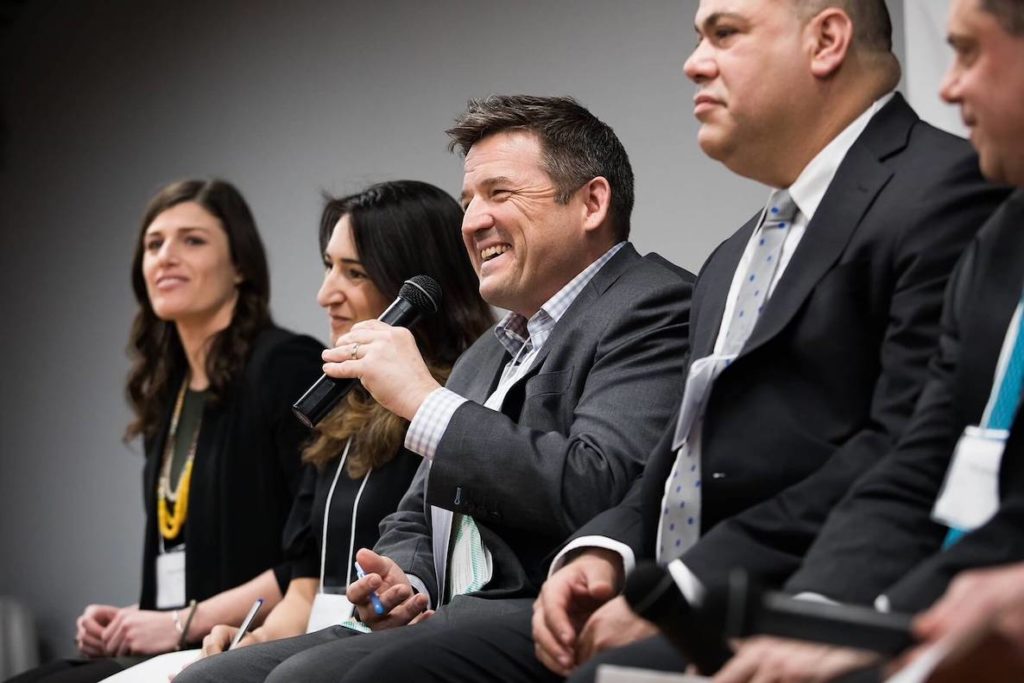
In particular, they have targeted the Latinx community, which disproportionately struggles to get financing from traditional banks. So far, the group has loaned money to 300 Latinx-owned businesses that struggled to participate in the federal Paycheck Protection Program; provided loans and business advice to help a local bakery expand in the neighborhood; and invested in veteran housing and neighborhood resources.
The groups initially formed their partnership in order to apply for funding through JP Morgan Chase’s PRO Neighborhoods competition, which awarded KLP $5 million in 2018 to be used over three years to help their underserved community. In February, the group received an additional $530,000 investment from JP Morgan Chase, as part of the bank’s efforts to support small businesses affected by Covid-19 and the ensuing economic recession.
KLP plans to use the new funds to help build community wealth and to protect long-term, local residents who may be displaced by gentrification in the area.
“Kensington doesn’t really have any anchor institutions. What we have is partnership,” O’Donnell says. “To make that stronger and create an anchor requires a network.”
Each of the four organizations that make up KLP brings different expertise in community development to the project: Impact works with neighborhood leaders to address local trauma and trains residents to become real estate developers through the Jumpstart Kensington program (modeled on Ken Weinstein’s Jumpstart Germantown). Community First Fund finances loans for businesses and mixed-use development projects. FINANTA helps create first-time homebuyer opportunities, in addition to providing loans for small business and consumers. LISC Philadelphia manages KLP’s community development strategy and provides technical assistance.
“Kensington doesn’t really have any anchor institutions. What we have is partnership,”
O’Donnell says. “To make that stronger and create an anchor requires a network.”
So far the program has given out $6.1 million to small businesses, $5.7 million to developers, $2.4 million to mixed-use projects and $450,132 to residential mortgages and consumer loans. These loans have led to the creation of 60 affordable housing units and have helped preserve and rehab another 148 units.
Latinx businesses and community development
KLP’s loans and education programs have supported small businesses like the Puerto Rican restaurant and bakery El Coquí Panadería y Repostería. Yazmin Auli, owner of El Coquí, has received loans through KLP partner FINANTA.
In addition to the loans, Auli participated in FINANTA’s Ella Emprende program, which helps business owners create strategic growth plans and build connections to help grow their businesses. The program is run in collaboration with Widener University’s Small Business Development Center and the Greater Philadelphia Hispanic Chamber of Commerce. Auli is now planning to open a second location for her restaurant later this fall.
“When I’ve needed FINANTA, FINANTA has been there,” Auli said through a translator.
KLP’s support for Latinx businesses owners is one of the major reasons Auli has chosen to work with a KLP partner. Latinx people make up about 65 percent of the neighborhood..
Nationally, Latinx businesses struggle to get loans compared to their white counterparts. When applying for loans over $100,000 from national banks, only 20 percent of Latinx-owned businesses obtained funding, compared to 50 percent of white-owned businesses, per a 2020 report from the Stanford Latino Entrepreneurship Initiative. Across loans of all sizes, only 51 percent of Latinx people received funding, compared to 77 percent of White people.
“You know, for Hispanics it is not easy to just walk into a bank and ask for a loan, it’s never been easy,” Marta Gonzalez, Auli’s financial assistant, says.
In contrast, 79 percent of KLP’s clients identify as Hispanic or Latinx. “Many of these businesses are simply disconnected from traditional banking,” Betancourt says. “We came in with that knowledge and the know-how to serve immigrant communities.”
 In addition to the loan program, KLP organizations have worked together on a mixed-use project near Allegheny Avenue and Emerald Street. Impact led the development project, bringing in 26 affordable housing units for veterans and the staffing firm First Step, which helps people get out of poverty through providing job coaching, transportation and housing assistance. Community First Fund provided the pre-development funding for the project.
In addition to the loan program, KLP organizations have worked together on a mixed-use project near Allegheny Avenue and Emerald Street. Impact led the development project, bringing in 26 affordable housing units for veterans and the staffing firm First Step, which helps people get out of poverty through providing job coaching, transportation and housing assistance. Community First Fund provided the pre-development funding for the project.
KLP isn’t the only organization developing mixed-use, affordable housing developments and supporting businesses in the area. The socially conscious development firm Shift Capital has also brought jobs, businesses and affordable housing options to Kensington.
In 2016, they opened Maken Studios which transformed two former warehouses into 260,000 feet of commercial space and brought 500 jobs to the area. In 2019, the group opened its first multi-family development, J-Centrel, which offers residents a rent break if they volunteer in Kensington.
Navigating the pandemic
Though KLP and other organizations have made strides towards encouraging development in the area, there is still much to be done. O’Donnell and Betancourt say that the Covid-19 pandemic has caused significant setbacks for the neighborhood.
“The pandemic and all that came along with it, it’s been a perfect storm,” O’Donnell says. During the pandemic, small businesses were struggling because the loans they were receiving were only financing their losses. To help these businesses, KLP members joined a group that was advocating for the state government to allocate additional grant funds for small businesses. In October, Governor Wolf announced that an additional $96 million in state grants would be provided for small businesses that were affected by the pandemic.
KLP plans to use their recent $530,000 investment from JP Morgan to support Latinx borrowers in particular, who have struggled to get assistance through programs like PPP. Latinx businesses often had less cash on hand when the pandemic struck than white-owned businesses and they were half as likely to receive PPP loans.
“They kept us informed, and they did everything that they possibly could to get us approved for all these grants and loans to sustain our payroll, inventory, rents and vendor payments,” Gonzalez says.
Though the Biden administration has made changes to PPP, like extending loans to legal residents rather than just U.S. citizens, intended to increase support for Latinx businesses, KLP and their partners have stepped up in the interim.
“Especially with Covid, whenever there’s city grants available — or any type of grant — they have reached out [to us],” Auli says.
“They kept us informed, and they did everything that they possibly could to get us approved for all these grants and loans to sustain our payroll, inventory, rents and vendor payments,” Gonzalez says.
Meanwhile, that warehouse that O’Donnell and Betancourt visited when first mulling a partnership? KLP hopes to develop a campus there, similar to the one at Emerald and Allegheny.
The 140,000 square-foot space will be transformed into 48 units of affordable housing, with some reserved for veterans and their families, and commercial space for small businesses and other tenants looking to serve the area.
Betancourt and O’Donnell hope that once the space is finished, other people will come, look out from the fifth floor and see the same potential they saw in the rest of the neighborhood.
The Citizen is one of 20 news organizations producing Broke in Philly, a collaborative reporting project on solutions to poverty and the city’s push towards economic justice. Follow the project on Twitter @BrokeInPhilly.




